Mega Archive CD: Part VIII: From Power Factory to NFL's Greatest
By Mento 0 Comments
I'll admit to being all poised to put the Mega Archive on hiatus again—these updates take a lot out of me, especially when it's almost wall-to-wall trash like this episode—but I can't just abandon it in the fourth quarter of 1993 so close to the finish line like this. It will take most of this year to ensure the Mega Archive has covered everything 1993-related but I'm determined to do so regardless. After that, it'll either be another long vacation before covering the system's busiest year of 1994 or a much more truncated format (though I keep threatening the latter and never going through with it). Even so, this is one of the most personally-rewarding features I do (besides, well, covering modern games I actually want to play) so I doubt I'll be able to stay away from futzing around on our increasingly-imperilled wiki for too long.
With that, let's move on to what the Sega CD's new library looked like in September '93. I'll level with you: with the exception of one of the most beloved Sega CD games of all time showing up in this entry, this particular batch might be one of the weakest I've ever seen. Great way to ease us into a new year of MD/SCD recaps, I suppose. Hell, that Part VIII both starts and ends with a barely-interactive FMV disaster is a real ominous portent of the darker times to come. After this, we'll have two regular Mega Archive updates that'll cover October and a bit of November before we return to CD land for a whole bunch of juicy movie tie-in games. Mmm-mmm, can't wait.
For all the Mega Archive recaps and links, be sure to check out The Official Mega Archive Mega Spreadsheet.
Part VIII: CD68-CD76 (September '93 - October '93)
CD68: Power Factory Featuring C+C Music Factory
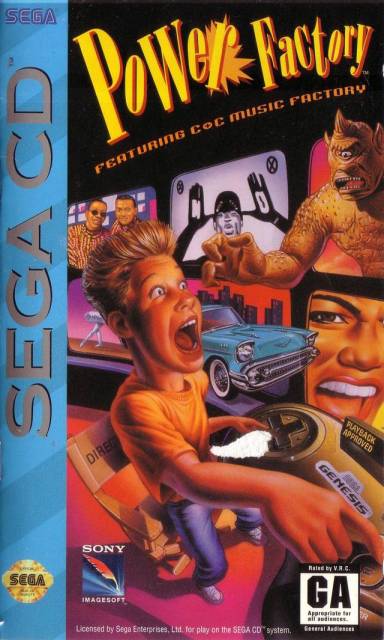
- Developer: Digital Pictures
- Publisher: Sony Imagesoft
- JP Release: N/A
- NA Release: September 1993
- EU Release: September 1993
- Franchise: Make My Video
- Genre: FMV Nonsense
- Theme: The CD-ROM Format Has Been Around for Five Years and We Still Don't Know What We're Doing
- Premise: C+C Music Factory already knows that their music videos need to replace any zaftig female vocalists with svelte lip-syncing models, but beyond that they're utterly lost. Make their video, won't you?
- Availability: Not with all the licenses involved. The Power Factory was decommissioned long ago.
- Preservation: We thought the Make My Video series was done and dusted, but we have one more—that, tellingly, dropped the "Make My Video" brand—for C+C Music Factory, the early house music act. As in, the "everybody dance now" guys. That song, which is actually called I'm Gonna Make You Sweat (too late; I've already seen what I'm covering this month), is featured in this game along with two others: Things That Make You Go Hmmm... and Here We Go Let's Rock & Roll. As before, you just mess around with a bunch of B-roll and ancient public domain footage to string together a passable MV, which is then reviewed through some arcane manner of arbitration. Is it even a game? Sega and Sony would like you to think so.
- Wiki Notes: Some extra text and corrections as well as screenshots and a header image. For the header, I went with the evocative shot of a hammer coming down on a CD: very much the kind of energy I'm looking to bring to this episode.
CD69: The Amazing Spider-Man vs. The Kingpin
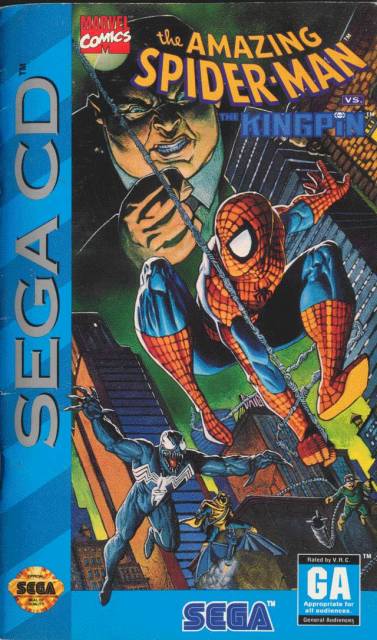
- Developer: Sega of America
- Publisher: Sega
- JP Release: N/A
- NA Release: September 1993
- EU Release: November 1993
- Franchise: Spider-Man
- Genre: Platbrawler
- Theme: "My Kusoge Sense is Tingling"
- Premise: Kingpin, who made his fortune through an empire of various business enterprises (legal and otherwise) across New York City, now plans to blow it all up with a nuke and blame Spider-Man for it. It's the evil magnate's best get-rich-quick scheme yet.
- Availability: It's also on the Mega Drive. We covered it in Part XI.
- Preservation: I'm still not 100% sure whether or not I ought to be re-litigating every Mega Drive game that shows up on Sega CD with a fancy new makeover and soundtrack, but it's not a process that was exceptionally common: often, these ports were considered not so much for the sake of "let's put this on everything to make more money" but "how do we make a meaningful change to this game to justify selling it on both this platform and its peripheral?". Mostly those meaningful changes are limited to adding CD audio and possibly some animated clips (this port has both), but it also reworked the levels and added several new ones for a more "Definitive Edition" feel. A snippet from an interview with Dave Foley (presumably not that Dave Foley) featured on SegaRetro suggested that the development team took the opportunity to re-add a bunch of content they left out of the original MD version due to space issues; a limitation that no longer applied to the CD format. It corroborates a metaphor I often return to which posits that game development jumping from cart to CD is like moving to a much bigger place but still having the same amount of furniture and decor: you end up filling that space with all kinds of pointless junk just so it doesn't look quite so cavernous and empty.
- Wiki Notes: Double-dip. All the page needed was the EU MCD release and its box art. However, I just had to put in more screenshots from the opening animation. That beautiful Parker mullet.
CD70: AH-3 Thunderstrike / Thunderhawk
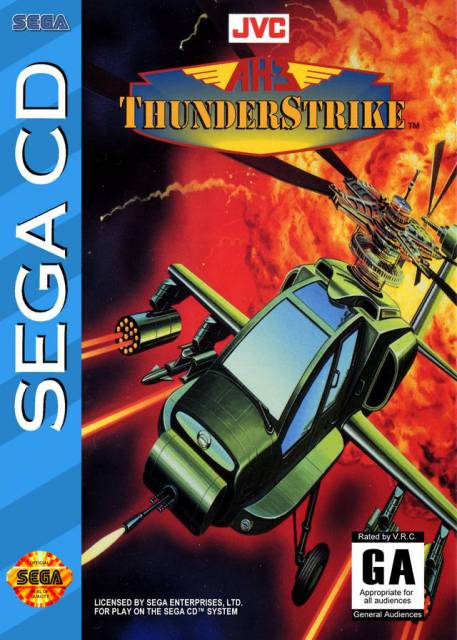
- Developer: Core Design
- Publisher: Victor Entertainment (JP) / JVC Musical Industries (NA) / Core Design (EU)
- JP Release: 1993-09-17 (as Thunderhawk)
- NA Release: November 1993 (as AH-3 Thunderstrike)
- EU Release: October 1993 (as Thunderhawk)
- Franchise: N/A
- Genre: Flight Sim
- Theme: Does Thunder Strike? I Thought That Was Lightning. Did AC/DC Lie to Me?
- Premise: Fly an attack chopper through multiple missions as you squint to see where all the tiny bad guy sprites are hiding before they fire their surface-to-air missiles. Like Where's Waldo? only with war crimes. (Well, more war crimes depending on the Where's Waldo? book in question.)
- Availability: There's a '96 PC port but I don't think any of the big digital stores preserved it.
- Preservation: Thunderhawk sits in this nice pleasant valley between flight sims that go overboard with the fancy polygonal graphics that slows everything down to a crawl and something like an After Burner where's a purely adrenaline-pumping action game. You still have mission targets to pursue and gauges to side-eye and some tactical awareness to call upon, but it's mostly just blowing shit up really fast before it can blow you up. Maybe like a first-person Desert Strike would be the best way to put it. The game's based on an older Amiga/ST game (the developers Core Design are British, so that tracks) but I wasn't entirely sure if it's a full sequel or a glorified remake. It also got a new title for North America, which suggests there was already a Thunderhawk out there sitting on the name. Roosting, maybe is the more accurate term.
- Wiki Notes: It already had a page separate from its Amiga/ST antecedent so I just shrugged and left it like that. The jump to CD-ROM definitely gave the developers more to work with and it looks completely different, so I doubt I'll get the equivalent of a wiki editor court martial over it. The page needed pretty much everything besides screenshots.
CD71: Warau Salesman

- Developer: Compile
- Publisher: Sega
- JP Release: 1993-09-17
- NA Release: N/A
- EU Release: N/A
- Franchise: Warau Salesman
- Genre: Adventure
- Theme: Ironic Comeuppances
- Premise: The Laughing Salesman can grant your heart's desire, but only if you don't mess up and break his rules. Yet everybody does. How vexing. For them.
- Availability: Licensed game. Though apparently the show did come back recently as a Netflix thing.
- Preservation: Here we have another impenetrable adventure game based on an anime license. The license this time is the darkly comic adventures of the titular salesman and his Wishmaster-esque approach to devastating the well-beings of those who become raging assholes once they get a taste of the good life. First created in the '60s by Motoo Abiko, the character saw a rise in popularity in the late '80s and early '90s due to an anime adaptation from which this game's animation and voice clips are sourced. While most Japanese adventure games tend to be dense, text-heavy menu-based affairs, this game uses a simplified UI that was becoming popular in the west around this time too: the cursor changes shape to represent any possible actions that can be performed, like eyes for examining something or a mouth for talking to an NPC. I'm sure you could brute force the game easily enough even if you couldn't understand the language, but that feels like missing the point. Either way, it's another example of the MCD becoming a home for anime licenses due to the increased multimedia potential of the CD-ROM format. I was a little surprised Compile was behind the game; they probably found a quiet moment between Puyos to take advantage of a license they'd been sitting on.
- Wiki Notes: A skeleton, so it needed everything. My thanks to wiki user Aruru-san for getting the ball rolling though.
CD72: Winning Post
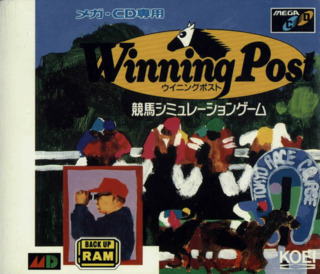
- Developer: Koei
- Publisher: Koei
- JP Release: 1993-09-17
- NA Release: N/A
- EU Release: N/A
- Franchise: Winning Post
- Genre: Simulation
- Theme: Horsies
- Premise: RAISE some thoroughbred horses to peak fitness. RACE those horses to win big payouts in the G1 circuit. RAZE the horses that disappoint you. (RAY'S the guy you want to talk to about horse murder.)
- Availability: As well as a bunch of contemporary ports, you could also just buy the newest one—Winning Post 10 released last year on nearly everything. You will need to know Japanese though.
- Preservation: Not content with just Cao Caos, Koei looked across the barnyard and centered their gaze on the noble, hard-working steed. Winning Post is a very long-running (because horses; see, they tend to run long distan-) franchise that involves selectively breeding and racing horses to make a small fortune, which then goes back into building a bigger stable with better horses. Drawing on my traumatic memories working on SuFami pages, horseracing games were (are?) shockingly popular in Japan, possibly in part because of their strictly-controlled gambling laws, and there's an even split between those where you're raising the horses and those where just inputting their performance data into an algorithm for betting "advice" (meanwhile, there's barely any where you're actively involved in the racing yourself). This game, which is the first Winning Post as opposed to the one released on Saturn in North America (actually the second, or maybe the 1.5th), debuted on Japanese home computers the PC-98 and the Sharp X68k—the usual domain of Koei—before hitting Super Famicom and Mega-CD within one week of each other. It also appeared on the 3DO, if I ever feel like taking on that mostly-cursed wiki project. The next three Winning Post games all hit Sega platforms, but not the Sega CD or Mega Drive; we're one and done here.
- Wiki Notes: SFC double-dip so just some screenshots.
CD73: Sonic CD / Sonic the Hedgehog CD

- Developer: Sonic Team
- Publisher: Sega
- JP Release: 1993-09-23 (as Sonic the Hedgehog CD)
- NA Release: 1993-11-23 (as Sonic CD)
- EU Release: October 1993 (as Sonic CD)
- Franchise: Sonic the Hedgehog
- Genre: Platformer
- Theme: Sonic Booom, Sonic Booom, Sonic Booooom
- Premise: Tired of getting chumped as the pushover penultimate boss of Sonic 2, Sonic's metallic doppelganger (doppelclanger?) decides to get serious for this CD-ROM debut for the franchise. (Yes, yes, I know that was Mecha Sonic in Sonic 2 not Metal Sonic. Dang Sonic pedants.)
- Availability: You can't get it separately on Steam like most of the early Sonics, but it is available in compilations like Sonic Origins. It's also on the Sega Genesis Mini 2.
- Preservation: The inevitable Sega CD Sonic game might well be the peripheral's most beloved overall, especially given a lack of stiff competition outside of niche RPGs like Lunar and the even more niche preferences of ironic FMV appreciators, but fans of the Sonic franchise do seem attached to the narrative innovations presented by its time-travel story, a cooler new antagonist in Metal Sonic, and the divisive debut of gaming's most persistent stan Amy Rose. There's a whole bunch of names attached to the development of Sonic CD: in addition to Sonic Team, there's several other Sega internal divisions as well as third-party programming assistance from H.I.C. (that's Human Interface Communications, because I guess calling a company just "Talking" was insufficient) and a credit to Toei Animation for the game's pretty decent animated cutscenes. I guess because Tails isn't in it (outside of cameos), the creators decided this was set between Sonic 1 and 2 thereby giving the franchise its first prequel. Did we need to further complicate the already richly dense chronology of Sonic the Hedgehog? Apparently.
- Wiki Notes: You kidding? This page has had more work done than Mickey Rourke. I've been on the internet long enough to know never to underestimate the dedication of Sonic fans.
CD74: Aoki Ookami to Shiroki Meshika: Genchou Hishi
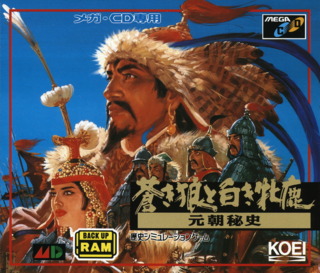
- Developer: Koei
- Publisher: Koei
- JP Release: 1993-09-24
- NA Release: N/A
- EU Release: N/A
- Franchise: Genghis Khan
- Genre: Strategy Sim
- Theme: Genghis Demonstrating His Khan-Do Attitude
- Premise: The Khan still fully intends to conquer the known world no matter which system he gets shunted off to next.
- Availability: It's on Steam, albeit in Japanese only. For anglophones, you'd be best off buying either of the localized Genesis or SNES versions.
- Preservation: The Winning Post MCD port I could understand since it hadn't debuted on Mega Drive yet, but there wasn't much reason to bring Genghis Khan II over as well seeing as it had already appeared on MD just a few months prior. Koei strategy fans don't really come to these games for the type of flashy presentations a CD port can offer, after all; it only serves to distract from all those delicious numbers and menus. Anyway, I think Koei themselves were conscious of this pointless doubling up because they didn't even bother to localize this even though they'd gone through the trouble to do so before with the aforementioned Mega Drive port. Any further details about the game itself can be gleaned from when I last covered it back in MA Part XXXI.
- Wiki Notes: Screenshots. The JP MCD release erroneously used the English title, which is a mistake I make too often myself.
CD75: Joe Montana's NFL Football

- Developer: Malibu Interactive
- Publisher: Sega
- JP Release: N/A
- NA Release: October 1993
- EU Release: N/A
- Franchise: Joe Montana Football
- Genre: Football
- Theme: Football
- Premise: Football
- Availability: Licenses and endorsements might make a modern rerelease difficult, on top of pointless. I think Sega's done faking any interest in football.
- Preservation: Less an iterative sequel in Sega's homegrown Joe Montana Football series, more a spin-off that could ably utilize the CD-ROM format for some FMV shenanigans. The prior 49ers QB shows up in scratchy video form to dispense advice much like the various licensed game sportspeoples before him, and the game uses the CD capacity to its fullest with a 38 team roster (including ten historical teams) and some sprite-scaling visual trickery. Park Place Productions and BlueSky Software were Sega's usual go-tos for their Joe Montana games—both companies were frequently employed by EA Sports also—but the former were developing a different NFL Sega CD game (see below) while the latter were already hard at work on the next MD game, NFL Football '94 Starring Joe Montana, which released the following month. Instead, we have the return of Malibu Interactive whom we last saw with the enhanced Sega CD port of Batman Returns [MACD Part VI]. Given the positive reception, Sega probably figured Malibu could be trusted with throwing FMV pigskins around. After all, seeing how it was vitally important for Sega to put out three friggin' NFL games in one friggin' season, it must have been a case of any port-developer in a storm.
- Wiki Notes: Screenshots and text. At least someone was kind enough to list all the featured historical teams. Great example of having some obscure bit of trivia burning a hole in your pocket that you need to put on the wiki somewhere.
CD76: NFL's Greatest: San Francisco vs. Dallas 1978-1993
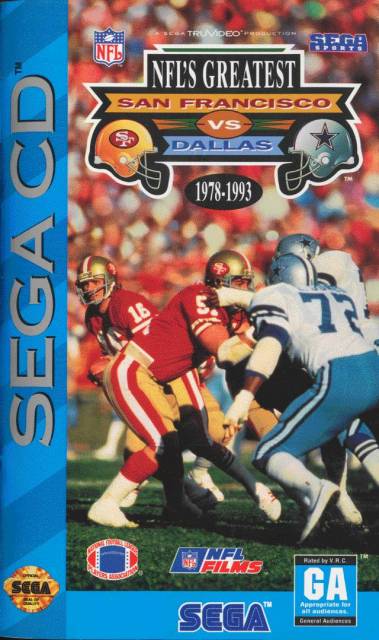
- Developer: Park Place Productions
- Publisher: Sega
- JP Release: N/A
- NA Release: October 1993
- EU Release: N/A
- Franchise: N/A
- Genre: Football
- Theme: Football
- Premise: Football
- Availability: Maybe a little too outdated now. Besides, 2008 would've been the ideal time for a reboot.
- Preservation: If Joe Montana's NFL Football was an earnest effort at making a CD-enhanced football game, NFL's Greatest is definitely a "let's fuck around and find out" experiment that's more in line with how we perceive the Sega CD today. It's all grody FMV clips bolted together by a mostly hands-off management gameplay loop where the player can call plays, substitutions, and the coin toss and that's about it. After making a decision, another FMV clip shows up to tell you how well your decision has fared. There's only two teams in the game—the eponymous ones, if that wasn't clear—but the clips come from 15 years of televized bouts between the two in order to cover a wide variety of possible plays. The amount of bouncing back and forth through time kind of makes NFL's Greatest like the world's first fourth-dimensional football game; very innovative stuff. Maybe it was pretty smart in retrospect that Sega had a real SCD football game release the same month just in case this dumb idea blew up in their faces (which, from what I can tell from scathing contemporary reviews, it sort of did).
- Wiki Notes: Skeleton, so it needed everything except release info. The original deck message was so enthusiastic (in a passive-aggressive way) I was loath to remove it, so I've kept it as is. What is this hidden video of which it speaks? Is it like a THPS "secret tape" bloopers reel of players getting debilitating concussions?
